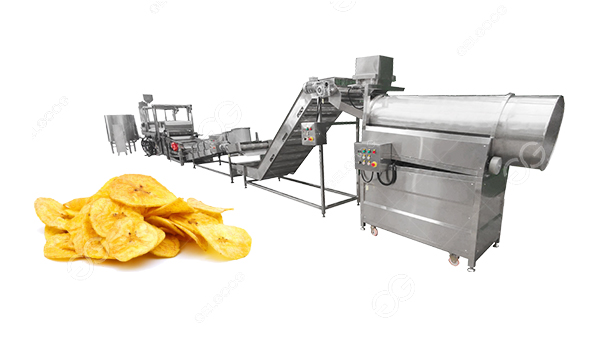Plantain chips, a beloved snack in many parts of the world, are not only delicious but also a nutritious alternative to traditional potato chips. As the demand for these tasty treats continues to grow, manufacturers are turning to technology to streamline production and improve the quality of plantain chips. In this article, we will explore the machines for plantain chip production and how they are revolutionizing the industry.

1. The traditional process
Before delving into the modern methods, it’s essential to understand the traditional plantain chip production process. Historically, this involved manual peeling, slicing, and frying of plantains. While this process allows for a homemade touch, it is labor-intensive, time-consuming, and often inconsistent in terms of chip size and quality.
2. The machine revolution
The advent of specialized machines has completely transformed plantain chip production. Here are the key areas where machines are making a difference:
- Peeling and slicing: Automated machines are capable of peeling and slicing plantains quickly and uniformly. These machines not only save time but also reduce labor costs and ensure a consistent product.
- Quality control: Advanced cameras and sensors in modern machines can detect defects in plantains, allowing for precise sorting and the removal of subpar pieces. This ensures that only the best-quality plantains are used in chip production.
- Frying: Automated fryers maintain precise temperature control, ensuring that the chips are fried to perfection. They also have the capacity to continuously produce chips, reducing production time and increasing output.
- Seasoning and packaging: Machines can evenly distribute seasonings and package the chips in various sizes and formats, making them ready for distribution and retail.
3. Benefits of machine-assisted production
The utilization of machines in plantain chip production offers numerous benefits:
- Increased efficiency: Machines work faster and with greater precision than human labor, resulting in higher production efficiency.
- Consistency: Uniformity in chip size, texture, and quality is guaranteed with machines, making the final product more appealing to consumers.
- Reduced labor costs: By automating tasks that were previously manual, manufacturers can reduce labor costs and allocate human resources to other vital areas of production.
- Enhanced food safety: Machines equipped with advanced technologies maintain a higher standard of food safety, reducing the risk of contamination and ensuring that products meet regulatory requirements.
- Scalability: Manufacturers can easily scale up production to meet growing demand by adding more machines or optimizing their existing processes.
Challenges and considerations
While machines have revolutionized plantain chip production, there are some challenges to be aware of:
- Initial investment: Acquiring and maintaining high-quality machines can be a significant upfront investment for manufacturers.
- Training: Operators need training to use the machines effectively and troubleshoot issues that may arise during production.
- Maintenance: Regular maintenance and upkeep of machines are essential to ensure consistent performance.
The adoption of machines in plantain chips production has marked a significant advancement in the industry. These machines offer consistent quality, increased efficiency, and the ability to meet growing consumer demand. While there are initial challenges to overcome, the long-term benefits far outweigh the costs. As technology continues to advance, we can expect even more innovation in plantain chip production, further enhancing the snack’s popularity and availability worldwide.
Hello,
I have 2 hectares of plantain farm and expect to begin harvest by next year June. I would like to add Value to my plantain by producing plantain chips.
How can I access this machine